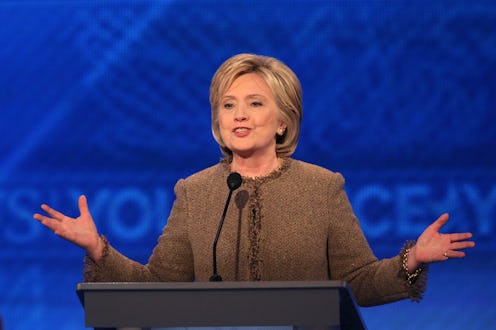News
Clinton's Risky "First Gentleman" Comments
If Hillary Clinton has a say, the role of first lady could evolve into something much more complex in the future. When pushed on the topic during Saturday's third Democratic primary debate, Clinton's "first gentleman" comments ended up stealing the spotlight when she suggested that the role should be somewhat intertwined with that of the president, adding that having the guidance of a knowledgeable partner could be beneficial for anyone looking to secure a place in the Oval Office. The former secretary of state then pointed to her own husband, former President Bill Clinton, as an example, inadvertently opening a line of questioning she may not have intended to drudge up.
"[The role of first lady] has been defined by each person who’s held it," Clinton remarked diplomatically, making sure to applaud the outstanding work of current First Lady Michelle Obama. Clinton, who left the role of first lady in 2001 with husband Bill's departure from the White House, then added that if elected president, she would transform the role for the better. "[The] family of a president has an extraordinary privilege of not only having a front row seat to history," she continued, "but also [the opportunity to make] her or his contribution," she said.
The current Democratic front-runner also joked that there were still a few duties she would be hesitant to turn over to Bill. "With respect to my own husband, I am probably going to pick the flowers and the china for state dinners," Clinton quipped.
While the moment was generally lighthearted, Clinton's comments did offer some perspective on how the former secretary of state might handle a second stay in the White House. Generally speaking, Clinton has tried to distance herself from her husband's tenure in office during previous debates and campaign rallies, choosing instead to pursue her own path rather than relying on dynastic inheritance — a touchy subject for the former FLOTUS who has worked hard to establish herself independently. During Saturday's debate however, Clinton seemed to backtrack on that strategy.
"I will certainly turn to [my spouse], as prior presidents have, for special missions and advice," Clinton remarked to debate moderators David Muir and Martha Raddatz, indicating that she would not object to seeking out the former president's know-how on issues such as the economy.
That could spell some trouble for Clinton for a few reasons. Despite economic gains under President Bill Clinton in the mid to late '90s (most notably in terms of GDP growth and a drastic decrease in unemployment), there were a few sore spots that could potentially transfer over into Clinton's campaign, should she choose to broach the subject again in the future.
Under President Bill Clinton, for example, the top 1 percent and 0.1 percent of income earners in the United States began to drastically pull away from the remainder of the middle and working class, leaving an inequality gap that only skyrocketed in the years following his tenure. According to a 2012 Congressional Budget Office report, between 1994 and 2001, the take-home funds for top earners rose nearly 20 percent. Given that Hillary's biggest rival, Bernie Sanders, has been pushing hard on income inequality in an attempt to garner the youth vote (one of the most influential voting blocs in the country), connecting herself with her husband's economic reign might not be the best plan.
Those numbers come with a few caveats, of course. While income inequality did indeed rise under Bill Clinton, between 1992 and 2000 the take-home pay for median income workers also rose over $6,000, bolstering the former president's overall track record of success. Compounding those numbers were statistics that showed both total inflation and core inflation had stabilized, leading to an increase in consumer confidence — both positive statistics on which former Secretary Clinton could lean if pushed to expand on her debate answer Saturday night.
For Clinton, dredging up her husband's legacy may or may not harbor some campaign hazards going forward. Certainly, that aspect wasn't the focus of much of the public's criticism following the third Democratic debate, with many choosing to hone in on the sexist aspect of the question itself (Glamour's Hillary Kelly frustratingly noted in an op-ed later that "the topic clearly would not have come up if Clinton weren't a woman," and many on social media ended up taking Clinton to task for what was perceived as a gendered response). Regardless, at Saturday's debate, Clinton opened the door to a wave of questioning that might prove murky going forward. The best she can do now is keep a level head and hope no one digs any deeper.
